Fake degree detection protects businesses from costly hiring mistakes through systematic verification of educational credentials and diploma mill identification. This guide provides HR professionals with simple yet effective methods to spot fraudulent degrees and implement reliable verification processes.
Key Takeaways
- Diploma mills cost companies billions annually through unqualified hires, legal liability, and damaged reputations from credential fraud.
- Accreditation verification serves as the primary defense against fake degrees by confirming institutional legitimacy through official databases.
- Document inspection reveals obvious fraud indicators including poor print quality, incorrect formatting, and suspicious institutional details.
- Direct institution contact provides definitive verification through registrar offices and official transcript services for authentic confirmation.
- Professional background check services streamline the process while ensuring legal compliance and comprehensive credential verification.
- Legal consequences affect both employees and employers including termination, lawsuits, and regulatory sanctions for fake degree fraud.
The Growing Threat of Diploma Mills
Diploma mills represent one of the fastest-growing forms of educational fraud in today's job market. These fake institutions sell degrees without requiring legitimate coursework or academic achievement. Modern diploma mills operate sophisticated websites that mimic real universities to deceive both job seekers and employers.
The financial impact on businesses continues to escalate as fake degree holders occupy positions requiring genuine expertise. Companies face direct costs through hiring unqualified candidates plus indirect expenses from legal liability and reputation damage. Recent studies indicate that credential fraud affects up to 40% of organizations across all industries.
Technology has made diploma mills more convincing than ever before. Fraudsters create realistic-looking websites, fake accreditation claims, and official-sounding verification services. However, these same technological advances provide HR professionals with better tools for fake degree detection and verification.
Common Diploma Mill Tactics
Diploma mills employ predictable strategies that trained professionals can easily identify. These fraudulent operations target both desperate job seekers and overwhelmed hiring managers who lack proper verification procedures.
Deceptive Marketing Strategies:
- Life Experience Credits: Offering degrees based on work experience rather than academic study
- Accelerated Timelines: Promising bachelor's or master's degrees in unrealistic timeframes
- Pay-Per-Degree Pricing: Guaranteeing graduation regardless of academic performance or attendance
Most diploma mills avoid direct interaction with employers during verification attempts. This avoidance pattern becomes a key indicator during the fake degree detection process.
Essential Diploma Mill Red Flags
Effective fake degree detection begins with recognizing standard warning signs that diploma mills exhibit consistently. These red flags appear across institutional websites, marketing materials, and credential documents. Professional HR teams can quickly identify suspicious patterns through systematic evaluation.
Diploma mills often claim prestigious-sounding names that mimic legitimate universities. They frequently add words like "International," "Global," or "American" to create false authority. Additionally, these fake institutions typically lack proper physical addresses or use commercial mail forwarding services.
Critical Warning Indicators:
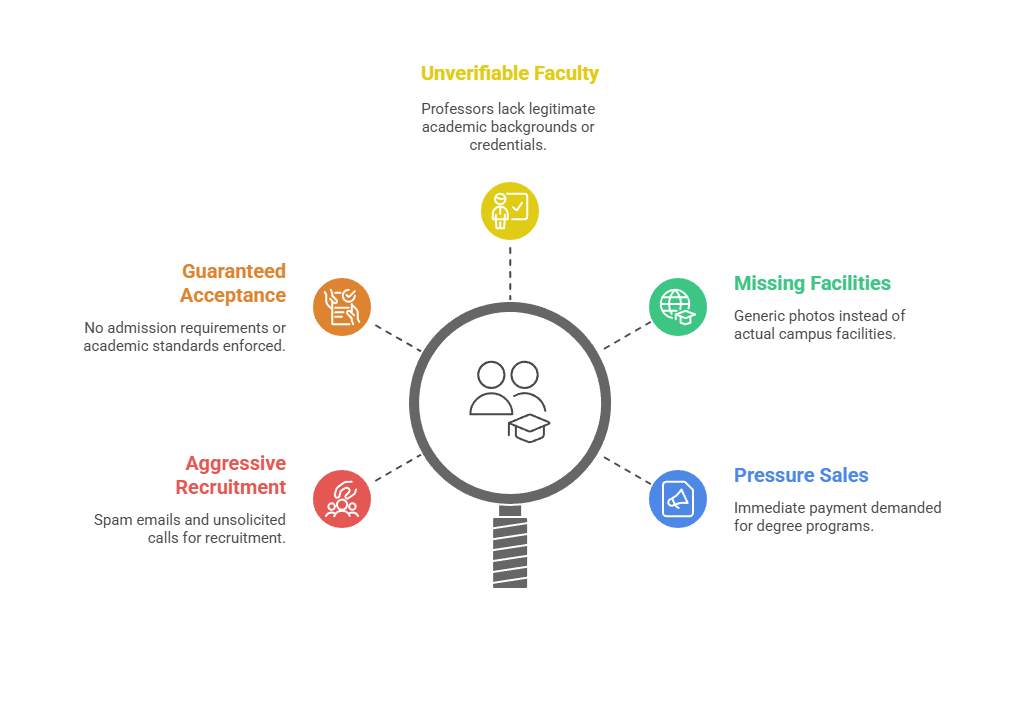
- Aggressive recruitment tactics through spam emails and unsolicited phone calls
- Guaranteed acceptance policies with no admission requirements or academic standards
- Unverifiable faculty credentials listing professors without legitimate academic backgrounds
- Missing campus facilities or generic stock photos instead of actual university buildings
- Pressure sales techniques demanding immediate payment for degree programs
| Red Flag Category | Legitimate Institution | Diploma Mill |
| Admission Requirements | Standardized tests, transcripts, essays | No requirements or minimal standards |
| Faculty Credentials | PhD from accredited schools, published research | Unverifiable degrees, no academic publications |
These warning signs help HR professionals quickly eliminate obviously fraudulent institutions during initial screening. However, sophisticated diploma mills require deeper investigation through formal verification processes.
Accreditation Verification Process
Accreditation serves as the cornerstone of legitimate higher education and the first line of defense in fake degree detection. Real universities undergo rigorous evaluation by recognized accrediting bodies that maintain strict educational standards. Diploma mills either lack accreditation entirely or claim fake accreditation from non-existent organizations.
The U.S. Department of Education maintains the official database of recognized accrediting agencies and accredited institutions. This database provides the authoritative source for verifying institutional legitimacy. However, navigating the system requires understanding different accreditation types and their specific requirements.
Step-by-Step Verification Process:
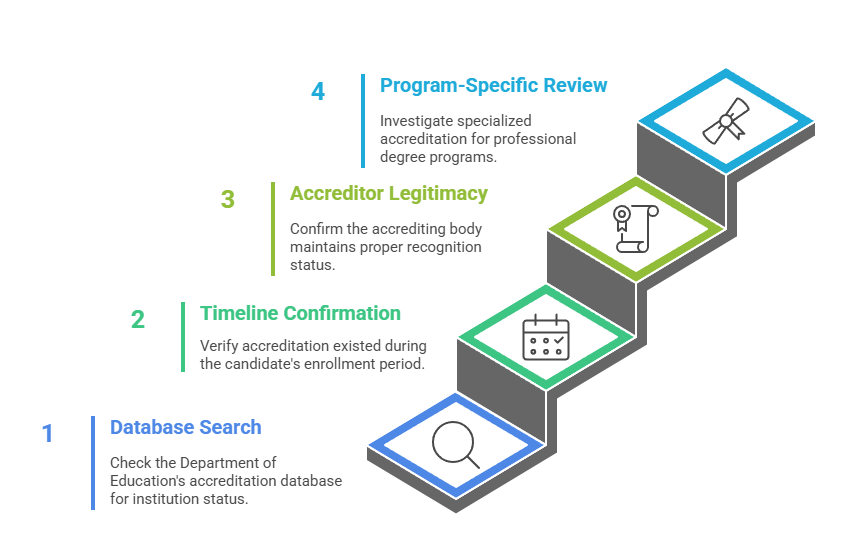
- Database Search: Check the Department of Education's accreditation database for institution status
- Timeline Confirmation: Verify accreditation existed during the candidate's enrollment period
- Accreditor Legitimacy: Confirm the accrediting body maintains proper recognition status
- Program-Specific Review: Investigate specialized accreditation for professional degree programs
Regional accreditation represents the highest standard for American universities and colleges. National accreditation applies to certain specialized institutions but requires additional scrutiny. Any institution lacking proper accreditation should trigger immediate red flags during the verification process.
International Accreditation Challenges
Foreign degree verification presents unique challenges requiring specialized knowledge of international education systems. Many countries maintain different accreditation standards that don't directly compare to American requirements.
International Verification Methods:
- Credential Evaluation Services: Professional organizations that assess foreign degrees against U.S. standards
- Embassy Education Offices: Official sources for information about legitimate institutions in specific countries
Professional credential evaluation becomes essential when hiring candidates with international educational backgrounds. These services identify diploma mills operating overseas while translating legitimate foreign degrees into equivalent U.S. qualifications.
Document Authentication Techniques
Physical document inspection reveals numerous fake degree indicators that basic visual examination can detect. Legitimate diplomas feature specific security elements, high-quality materials, and consistent formatting that diploma mills struggle to replicate accurately. Professional document authentication provides immediate fraud detection in many cases.
Physical Inspection Elements:
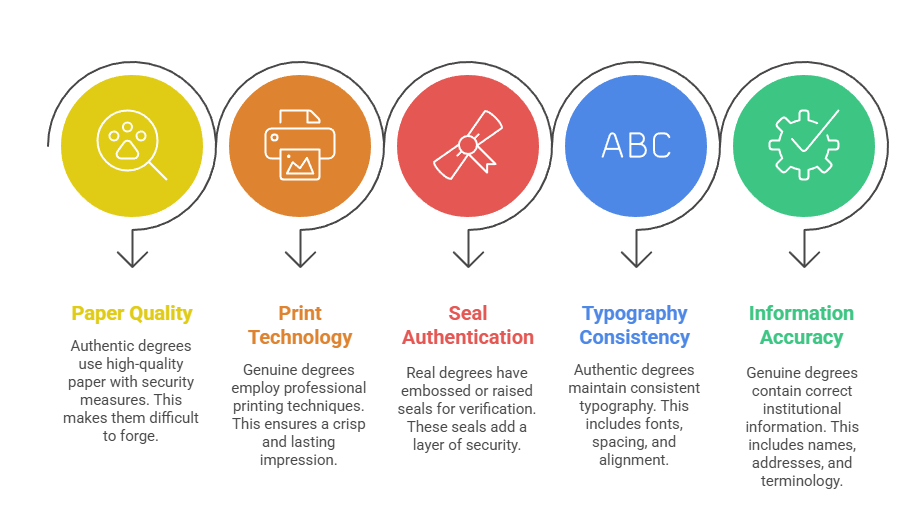
- Paper Quality: Legitimate degrees use heavy cardstock with watermarks or security features
- Print Technology: Professional offset printing versus home inkjet or laser printer output
- Seal Authentication: Embossed or raised seals rather than flat printed imitations
- Typography Consistency: Proper fonts, spacing, and alignment throughout the document
- Information Accuracy: Correct institutional names, addresses, and official terminology
| Authentication Factor | Legitimate Diploma | Fake Degree Warning |
| Paper Weight | Heavy cardstock (80-120 gsm) | Thin copy paper or lightweight stock |
| Security Features | Watermarks, special fibers, UV elements | Missing security elements |
| Print Quality | Sharp text, consistent colors | Blurry text, color variations |
Advanced authentication may require ultraviolet lighting, magnification, or forensic analysis for sophisticated fakes. However, most diploma mill products fail basic visual inspection when HR professionals know what to examine.
Professional authentication services offer expert analysis for high-stakes positions or suspicious documents. The investment proves worthwhile considering the potential costs of hiring individuals with fake credentials.
Digital Diploma Verification
Electronic diplomas and digital credentials require different authentication approaches than traditional paper documents. Legitimate institutions increasingly offer blockchain-based verification systems that provide tamper-proof credential confirmation.
Digital Authentication Steps:
- Institution Website Verification: Confirm the institution offers official digital diploma services
- Blockchain Validation: Use institutional verification portals for blockchain-based credentials
Digital credentials often include embedded verification codes or QR links that connect to institutional databases. However, diploma mills may create fake digital verification systems, making direct institutional contact essential.
Direct Institution Verification Methods
Direct contact with educational institutions provides the most reliable method for confirming degree authenticity. Registrar offices maintain official student records and can verify graduation status, degree types, and attendance dates through established procedures. This approach requires patience but delivers definitive results.
Professional verification protocols ensure consistent and legally compliant information gathering. Most institutions charge modest fees for verification services while maintaining strict privacy policies that require written authorization. These administrative requirements actually support authenticity since diploma mills rarely maintain such detailed procedures.
Verification Contact Protocol:
- Official Channels Only: Use published phone numbers and verified email addresses from institutional websites
- Written Authorization: Obtain signed candidate consent for all verification requests and transcript orders
- Specific Information Requests: Ask for graduation dates, degree titles, major fields of study, and GPA when relevant
- Documentation Requirements: Maintain written records of all verification attempts, responses, and follow-up communications
Some institutions require specific forms or follow particular procedures for releasing student information. These requirements, while sometimes cumbersome, provide additional legitimacy indicators since fake institutions avoid such detailed administrative processes.
Handling Verification Obstacles
Closed institutions, administrative delays, and unresponsive offices can complicate direct verification efforts. However, alternative resources often provide solutions for challenging verification scenarios.
Alternative Verification Resources:
- National Student Clearinghouse: Comprehensive database covering most U.S. institutions and student records
- State Education Departments: Maintain records for defunct institutions and regulatory oversight information
Persistence often resolves apparent verification roadblocks through alternative contact methods or supervisory escalation. Nevertheless, inability to verify credentials through any legitimate channel should raise serious authenticity concerns.
Professional Background Check Integration
Modern background check services incorporate sophisticated fake degree detection capabilities that streamline the verification process while ensuring legal compliance. These professional services combine automated database searches with manual verification procedures to provide comprehensive educational screening. Integration with existing HR workflows makes systematic degree verification both practical and cost-effective.
Professional services maintain relationships with educational institutions that facilitate faster verification turnaround times. They also understand FCRA requirements and employment law compliance issues that protect employers from legal challenges. Additionally, these services provide documented verification attempts that satisfy due diligence requirements.
Background Check Service Benefits:
- Automated Database Screening: Initial verification through comprehensive educational databases and institutional partnerships
- Manual Verification Backup: Human verification specialists handle complex cases and unresponsive institutions
- Legal Compliance Assurance: FCRA-compliant procedures with proper consent forms and adverse action protocols
- Documentation Standards: Detailed verification reports that satisfy legal and audit requirements
- Cost-Effective Scaling: Volume pricing and streamlined processes reduce per-verification costs
Technology integration enables real-time verification status updates and automated flagging of suspicious credentials. However, professional human oversight remains essential for complex verification scenarios and unusual educational backgrounds.
The combination of automated screening with expert manual review provides optimal fake degree detection effectiveness while maintaining reasonable costs and turnaround times.
Selecting Verification Service Providers
Choosing appropriate background check providers requires evaluating their educational verification expertise, technology capabilities, and compliance standards. Not all background check companies offer sophisticated fake degree detection services.
Provider Evaluation Criteria:
- Educational Verification Specialization: Specific expertise in diploma mill detection and institutional verification
- Technology Platform Capabilities: Integration options with existing HR systems and applicant tracking software
Established providers typically offer better institutional relationships and verification success rates. They also maintain current knowledge of diploma mill trends and emerging fraud tactics.
Technology Solutions for Enhanced Detection
Advanced technology platforms revolutionize fake degree detection through artificial intelligence, machine learning algorithms, and comprehensive institutional databases. These solutions integrate seamlessly with applicant tracking systems to provide automated screening capabilities. Modern platforms flag suspicious credentials for manual review while processing routine verifications automatically.
Blockchain technology emerges as a game-changing solution for secure credential verification. Several universities now implement blockchain-based diploma systems that provide tamper-proof verification methods. While still in early adoption phases, blockchain credentials may eventually eliminate traditional fake degree vulnerabilities entirely.
Technology Platform Features:
- AI-Powered Screening: Machine learning algorithms that identify diploma mill patterns and suspicious credential combinations
- Real-Time Database Updates: Current institutional status information and accreditation changes through connected databases
- Automated Compliance Tracking: Built-in FCRA compliance monitoring with documentation and consent management
- Integration Capabilities: Seamless connection with existing HR systems and workflow automation tools
However, technology solutions require human oversight and cannot replace professional judgment in complex verification scenarios. The optimal approach combines automated initial screening with expert manual review for flagged cases.
Blockchain Credential Verification
Blockchain-based credentials offer revolutionary security features that make forgery virtually impossible. Educational institutions can issue tamper-proof digital diplomas that employers can verify instantly through secure blockchain networks.
Early adopters include major universities that issue blockchain credentials alongside traditional paper diplomas. This dual approach provides enhanced security while maintaining compatibility with existing verification systems.
Legal Consequences and Compliance Requirements
Fake degree fraud carries serious legal consequences that extend far beyond simple employment termination. Criminal charges, civil liability, and professional license revocation represent potential outcomes for individuals caught using fraudulent credentials. Employers also face significant legal exposure when employees with fake degrees cause harm through incompetence or professional misconduct.
Understanding these legal implications helps HR professionals communicate the seriousness of credential fraud while implementing appropriate protective measures. Healthcare, education, and licensed professions carry particular risks where fake credentials can endanger public safety and trigger regulatory sanctions.
Legal Consequence Categories:
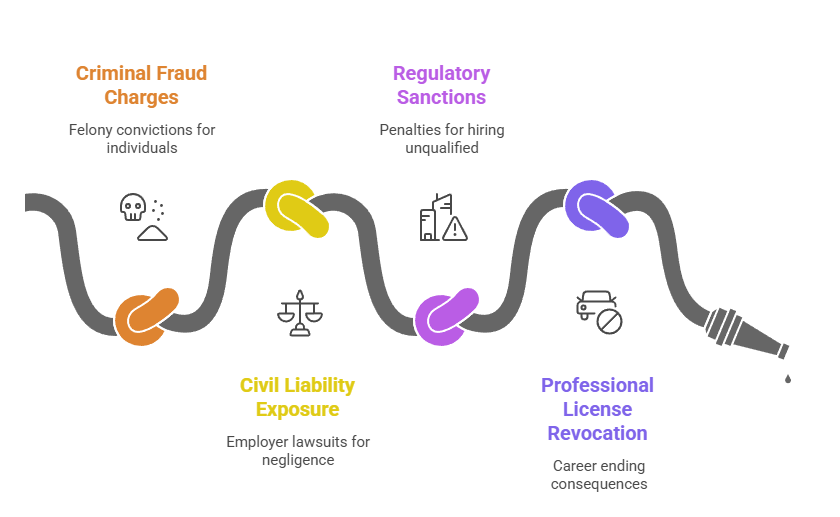
- Criminal Fraud Charges: Potential felony convictions for individuals presenting fake degrees during employment processes
- Civil Liability Exposure: Employer lawsuits when fake degree holders cause professional negligence or safety incidents
- Regulatory Sanctions: Industry-specific penalties for hiring unqualified individuals in regulated professions
- Professional License Revocation: Loss of professional credentials and career-ending consequences for licensed practitioners
| Stakeholder | Potential Legal Consequences | Risk Mitigation Strategies |
| Employees | Termination, criminal charges, civil lawsuits | Honest credential reporting, legitimate education |
| Employers | Negligent hiring claims, regulatory fines | Comprehensive verification, documented procedures |
| Licensed Professionals | License revocation, malpractice liability | Continuing education, credential maintenance |
FCRA compliance requirements govern how background check information can be collected, used, and stored throughout the hiring process. Proper consent forms, adverse action procedures, and record retention policies protect employers from legal challenges while enabling thorough verification processes.
Employment Law Considerations
Discovering fake degrees after hiring requires careful legal handling to avoid wrongful termination claims or discrimination allegations. Employment attorneys recommend documenting the discovery process thoroughly while providing opportunities for employee explanation.
Following established disciplinary procedures becomes essential even in clear fraud cases. Consistent policy application protects employers from claims of discriminatory enforcement or procedural violations.
Industry-Specific Verification Standards
Different industries maintain varying educational verification requirements based on regulatory oversight, safety considerations, and professional licensing needs. Healthcare, education, finance, and engineering sectors typically require more rigorous verification procedures than general business positions. Understanding industry-specific standards ensures appropriate verification depth while maintaining compliance with sector regulations.
High-Risk Industry Requirements:
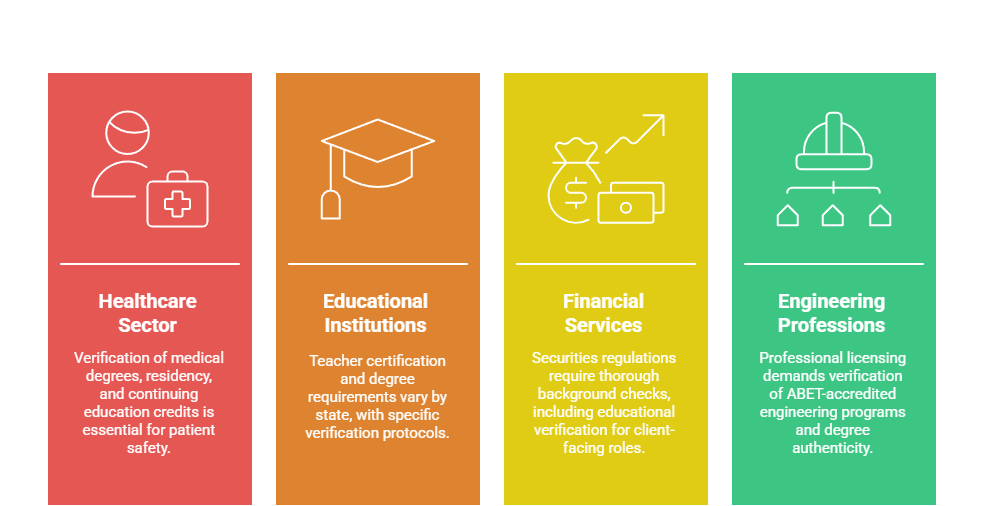
- Healthcare Sector: Patient safety concerns necessitate verification of medical degrees, residency completion, and continuing education credits
- Educational Institutions: Teacher certification and degree requirements vary by state with specific verification protocols mandated by education departments
- Financial Services: Securities regulations mandate comprehensive background checks including educational verification for client-facing positions
- Engineering Professions: Professional licensing requirements demand verification of ABET-accredited engineering programs and degree authenticity
Regulated industries often provide specific guidance on acceptable verification procedures and documentation requirements. Additionally, professional associations establish best practices that exceed minimum legal requirements.
Professional License Cross-Verification
Professional licenses provide additional verification layers that complement educational background checks effectively. However, some licensing boards accept questionable credentials, making independent educational verification essential even for licensed professionals.
Cross-referencing professional licenses with educational credentials can reveal discrepancies that indicate potential fraud in either area. This dual verification approach strengthens overall candidate screening while identifying inconsistent information patterns.
Cost-Benefit Analysis of Verification Programs
Comprehensive fake degree detection programs require upfront investment in verification services, staff training, and technology platforms. However, the costs of hiring individuals with fraudulent credentials far exceed verification expenses. A single bad hire can cost organizations tens of thousands of dollars in training, productivity losses, and potential legal liability.
Cost-Benefit Comparison:
- Verification Investment: Professional services typically cost $25-75 per degree with volume discounts available
- Bad Hire Consequences: Average costs range from $15,000-50,000 including recruitment, training, and replacement expenses
- Legal Liability Exposure: Potential costs in regulated industries can reach hundreds of thousands for negligent hiring claims
Return on investment calculations clearly favor comprehensive verification programs, especially for positions requiring specific educational qualifications. The peace of mind and legal protection justify modest verification expenses.
Budget Planning for Verification Programs
Developing realistic budgets for fake degree detection requires considering verification volume, service provider costs, and technology platform expenses. Most organizations find that professional verification services offer better value than internal verification attempts.
Volume-based pricing from background check providers reduces per-verification costs while ensuring consistent quality and legal compliance. Technology integration costs should be evaluated against long-term efficiency gains and reduced administrative overhead.
Building Effective Verification Policies
Successful fake degree detection requires clear organizational policies that establish consistent verification procedures across all hiring decisions. Written policies protect organizations legally while ensuring fair treatment of all candidates. These policies should specify which positions require verification, acceptable verification methods, and procedures for handling discovered fraud.
Policy development must balance thoroughness with practicality to avoid creating unnecessary barriers to hiring qualified candidates. Clear guidelines help HR staff make consistent decisions while providing candidates with transparent expectations about the verification process.
Essential Policy Elements:
- Position-Specific Requirements: Clear criteria for which roles require degree verification based on job responsibilities and risk factors
- Verification Timeline Standards: Realistic timeframes that allow thorough verification without delaying critical hiring decisions
- Documentation Requirements: Detailed record-keeping standards that satisfy legal compliance and audit needs
- Escalation Procedures: Clear protocols for handling verification challenges, suspicious findings, and candidate disputes
Regular policy reviews ensure procedures remain current with legal requirements and industry best practices. Staff training programs help ensure consistent policy implementation across all hiring managers and HR personnel.
Training HR Staff on Detection Methods
Effective fake degree detection requires trained personnel who understand verification procedures and can recognize fraud indicators. Regular training programs should cover diploma mill trends, technology tools, and legal compliance requirements.
Training curricula should include hands-on practice with document authentication, database searches, and institutional verification procedures. Case studies help staff recognize common fraud patterns while building confidence in verification decisions.
Conclusion
Fake degree detection requires systematic approaches that combine document authentication, accreditation verification, and direct institutional contact to protect organizations from costly credential fraud. Simple verification procedures can identify most diploma mills while professional background check services handle complex cases efficiently. The investment in comprehensive verification programs prevents expensive hiring mistakes and protects companies from significant legal and financial consequences associated with employing individuals who hold fraudulent credentials. As diploma mills become increasingly sophisticated, staying current with detection methods and maintaining robust verification policies becomes essential for effective risk management and successful talent acquisition.
Frequently Asked Questions
How can I quickly identify obvious diploma mills during initial screening?
Look for institutions with aggressive marketing tactics, guaranteed acceptance policies, and unverifiable accreditation claims. Diploma mills often use prestigious-sounding names with words like "International" or "Global" while lacking proper physical addresses or legitimate faculty credentials.
What is the most reliable method for verifying degree authenticity?
Direct contact with the institution's registrar office provides the most reliable verification method. Always use official contact information from the institution's website and obtain written consent from candidates before requesting verification or transcripts.
How much should I budget for professional degree verification services?
Professional verification services typically cost $25-75 per degree, depending on complexity and turnaround time. This modest investment is minimal compared to the potential costs of hiring someone with fake credentials, which can reach $15,000-50,000 per bad hire.
Are online degrees from legitimate universities as reliable as traditional degrees?
Yes, online degrees from properly accredited institutions are equivalent to traditional campus-based degrees and equally verifiable. The key is confirming proper accreditation rather than focusing on the educational delivery method.
What should I do if I discover an employee has a fake degree after hiring?
Document the discovery process carefully, consult with employment law counsel, and follow your established disciplinary procedures. Most cases result in termination for cause, but proper documentation and consistent policy application protect against wrongful termination claims.
Can sophisticated diploma mills fool professional background check companies?
Advanced diploma mills can sometimes deceive inexperienced verification services, which is why selecting reputable background check companies with specific expertise in educational verification becomes crucial. Look for providers with established institutional relationships and proven track records in fake degree detection.
Additional Resources
- U.S. Department of Education Database of Accredited Institutions
https://ope.ed.gov/accreditation/ - National Student Clearinghouse Degree Verification Services
https://www.studentclearinghouse.org/verification/ - Federal Trade Commission Guide to Diploma Mills
https://www.ftc.gov/tips-advice/business-center/guidance/diploma-mills - Council for Higher Education Accreditation (CHEA) Database
https://www.chea.org/chea-database-institutions-programs-accredited-chea-recognized-organizations - Professional Background Screening Association (PBSA) Best Practices
https://www.professionalbackground.org/ - Society for Human Resource Management (SHRM) Background Check Guidelines
https://www.shrm.org/resourcesandtools/tools-and-samples/toolkits/pages/backgroundchecks.aspx

GCheck Editorial Team
Meet the GCheck Editorial Team, your trusted source for insightful and up-to-date information in the world of employment background checks. Committed to delivering the latest trends, best practices, and industry insights, our team is dedicated to keeping you informed.
With a passion for ensuring accuracy, compliance, and efficiency in background screening, we are your go-to experts in the field. Stay tuned for our comprehensive articles, guides, and analysis, designed to empower businesses and individuals with the knowledge they need to make informed decisions.
At GCheck, we're here to guide you through the complexities of background checks, every step of the way.





